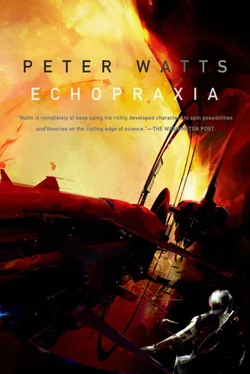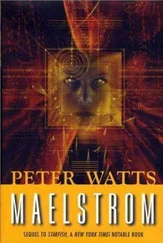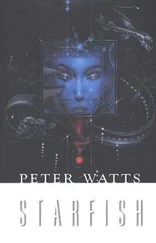We are already closing in on learning techniques that bypass conscious awareness, [104] Kazuhisa Shibata et al., “Perceptual Learning Incepted by Decoded fMRI Neurofeedback Without Stimulus Presentation,” Science 334, no. 6061 (December 9, 2011): 1413–1415, doi:10.1126/science.1212003.
a la Lianna Lutterodt’s training at the hands of her Bicameral masters. Likewise, the precursors of the gimp hood which Brüks uses in lieu of a brain implant can be seen taking shape in a diversity of mind-reading/writing tech already extant in the literature. [105] Jack L. Gallant et al., “Identifying Natural Images from Human Brain Activity,” Nature 452, no. 7185 (March 20, 2008): 352+.
, [106] T. Horikawa et al., “Neural Decoding of Visual Imagery During Sleep,” Science 340, no. 6132 (May 3, 2013): 639–642, doi:10.1126/science.1234330.
, [107] Kendrick N. Kay and Jack L. Gallant, “I Can See What You See,” Nature Neuroscience 12, no. 3 (March 2009): 245–245, doi:10.1038/nn0309-245.
, [108] Thomas Naselaris et al., “Bayesian Reconstruction of Natural Images from Human Brain Activity,” Neuron 63, no. 6 (September 24, 2009): 902–915, doi:10.1016/j.neuron.2009.09.006.
, [109] Jon Stokes, “Sony Patents a Brain Manipulation Technology,” Ars Technica , April 7, 2005, http://arstechnica.com/uncategorized/2005/04/4785-2/ .
Brüks’s dependence on Cognital, on the other hand, marks him truly as a relic of a past age (ours, in fact): memory boosters are already in the pipe, [110] Johannes Gräff and Li-Huei Tsai, “Cognitive Enhancement: A Molecular Memory Booster,” Nature 469, no. 7331 (January 27, 2011): 474–475, doi:10.1038/469474a.
, [111] Dillon Y. Chen et al., “A Critical Role for IGF-II in Memory Consolidation and Enhancement,” Nature 469, no. 7331 (January 27, 2011): 491–497, doi:10.1038/nature09667.
, [112] Reut Shema et al., “Enhancement of Consolidated Long-Term Memory by Overexpression of Protein Kinase Mζ in the Neocortex,” Science 331, no. 6021 (March 4, 2011): 1207–1210, doi:10.1126/science.1200215.
and as far back 2008, one in five working scientists already indulged in brain-doping to help keep up with the competition. [113] Brendan Maher, “Poll Results: Look Who’s Doping,” Nature News 452, no. 7188 (April 9, 2008): 674–675, doi:10.1038/452674a.
The use of massively multiplayer online games as a tool for epidemiological simulation was first proposed by Loffgren and Fefferman; [114] Eric T. Lofgren and Nina H Fefferman, “The Untapped Potential of Virtual Game Worlds to Shed Light on Real World Epidemics,” The Lancet Infectious Diseases 7, no. 9 (September 2007): 625–629, doi:10.1016/S1473-3099(07)70212-8.
they, in turn, were inspired by an unexpected pandemic of “corrupted blood” in World of Warcraft, [115] “Corrupted Blood Incident,” Wikipedia, the Free Encyclopedia , August 12, 2013, http://en.wikipedia.org/w/index.php?title=Corrupted_Blood_incident&oldid=566358819 .
which occurred because people in RPGs—like those in real life—often don’t behave the way they’re supposed to. I don’t know how many have since picked up this ball and run with it—at least one paper speaks of using online gaming for economics research [116] John Gaudiosi, “Gameworld:Virtual Economies in Video Games Used as Case Studies,” Reuters , October 1, 2009, http://www.reuters.com/article/2009/10/01/videogames-economies-idUSSP15565220091001 .
—but if that’s all there is I think we’re missing a huge opportunity.
Near the end of this novel there’s a teaching moment on the subject of natural selection. Most people seem to think that organisms develop adaptive traits in response to environmental change. This is bullshit. The environment changes and those who already happen to have newly-adaptive traits don’t get wiped out. A deteriorating Daniel Brüks muses on an especially neat case in point, the curious fact that the building blocks of advanced neural architecture already exist in single-celled animals lacking even the most rudimentary nervous systems. [117] Alexandre Alié and Michaël Manuel, “The Backbone of the Post-synaptic Density Originated in a Unicellular Ancestor of Choanoflagellates and Metazoans,” BMC Evolutionary Biology 10, no. 1 (2010): 34, doi:10.1186/1471-2148-10-34.
, [118] P. Burkhardt et al., “Primordial Neurosecretory Apparatus Identified in the Choanoflagellate Monosiga Brevicollis,” Proceedings of the National Academy of Sciences 108, no. 37 (August 29, 2011): 15264–15269, doi:10.1073/pnas.1106189108.
, [119] X. Cai, “Unicellular Ca2+ Signaling ‘Toolkit’ at the Origin of Metazoa,” Molecular Biology and Evolution 25, no. 7 (April 3, 2008): 1357–1361, doi:10.1093/molbev/msn077.
, [120] B. J. Liebeskind, D. M. Hillis, and H. H. Zakon, “Evolution of Sodium Channels Predates the Origin of Nervous Systems in Animals,” Proceedings of the National Academy of Sciences 108, no. 22 (May 16, 2011): 9154–9159, doi:10.1073/pnas.1106363108.
A couple of isolated factoids. Fruit flies save energy in impoverished environments by becoming forgetful; [121] Pierre-Yves Plaçais and Thomas Preat, “To Favor Survival Under Food Shortage, the Brain Disables Costly Memory,” Science 339, no. 6118 (January 25, 2013): 440–442, doi:10.1126/science.1226018.
the construction and maintenance of memories is, after all, a costly affair. I imagine that Rhona McLennan’s “Splinternet” is suffering the same sort of energetic triage after Icarus drops offline. And that bit where Brüks wondered why Moore even bothered exercising to stay in shape? That’s because we’re within spitting distance of a pill that puts your metabolism into hardbody mode even if you spend the whole day sitting on the couch snarfing pork rinds and watching American Idol . [122] Margaret Talbot, “Brain Gain,” The New Yorker , April 27, 2009, http://www.newyorker.com/reporting/2009/04/27/090427fa_fact_talbot .
, [123] Vihang A. Narkar et al., “AMPK and PPARδ Agonists Are Exercise Mimetics,” Cell 134, no. 3 (August 8, 2008): 405–415, doi:10.1016/j.cell.2008.06.051.
The poem Brüks discovers in the desert as his mind is coming apart is not, contrary to what you might think, a hallucination. It is real. It is the warped brainchild of Canadian poet Christian Bök, [124] “Christian Bök,” Wikipedia, the Free Encyclopedia , September 14, 2013.
who has spent the past decade figuring out how to build a gene that not only spells a poem, but which functionally codes for a fluorescing protein whose amino acid sequence decodes into a response to that poem. [125] Jamie Condliffe, “Cryptic Poetry Written in a Microbe’s DNA,” CultureLab, New Scientist Online , 2011, http://www.newscientist.com/blogs/culturelab/2011/05/christian-boks-dynamic-dna-poetry.html .
The last time we hung out he’d managed to insert it into E. coli , but his ultimate goal is to stick it into Deinococcus radiolarians , aka “Conan the Bacterium,” [126] “ Deinococcus Radiodurans ,” Wikipedia, the Free Encyclopedia , July 29, 2013.
aka the toughest microbial motherfucker that ever laughed at the inside of a nuclear reactor. If Christian’s project comes through, his words could be iterating across the face of this planet right up until the day the sun blows up. Who knew poetry could ever get that kind of a print run?
Finally: free will. Although free will (rather, its lack) is one of Echopraxia ’s central themes (the neurological condition of echopraxia is to autonomy as blindsight is to consciousness), I don’t have much to say about it because the arguments seem so clear-cut as to be almost uninteresting. Neurons do not fire spontaneously, only in response to external stimuli; therefore brains cannot act spontaneously, only in response to external stimuli. [127] Yes, there may be random elements—quantum flickers that introduce unpredictability into one’s behavior—but slaving your decisions to a dice roll doesn’t make you free.
No need to wade through all those studies that show the brain acting before the conscious mind “decides” to. [128] Benjamin Libet et al., “Time of Conscious Intention to Act in Relation to Onset of Cerebral Activity (readiness-Potential) the Unconscious Initiation of a Freely Voluntary Act,” Brain 106, no. 3 (September 1, 1983): 623–642, doi:10.1093/brain/106.3.623.
, [129] Chun Siong Soon et al., “Unconscious Determinants of Free Decisions in the Human Brain,” Nature Neuroscience 11, no. 5 (May 2008): 543–545, doi:10.1038/nn.2112.
Forget the revisionist interpretations that downgrade the definition from free will to will that’s merely unpredictable enough to confuse predators . [130] Björn Brembs, “Towards a Scientific Concept of Free Will as a Biological Trait: Spontaneous Actions and Decision-making in Invertebrates,” Proceedings of the Royal Society B: Biological Sciences (December 15, 2010), doi:10.1098/rspb.2010.2325.
, [131] Alexander Maye et al., “Order in Spontaneous Behavior,” PLoS ONE 2, no. 5 (May 16, 2007): e443, doi:10.1371/journal.pone.0000443.
It’s simpler than that: the switch cannot flip itself. QED. If you insist on clinging to this free will farce I’m not going to waste much time arguing here: plenty of others have made the case far more persuasively than I ever could. [132] Anthony R Cashmore, “The Lucretian Swerve: The Biological Basis of Human Behavior and the Criminal Justice System,” Proceedings of the National Academy of Sciences of the United States of America 107, no. 10 (March 9, 2010): 4499–4504, doi:10.1073/pnas.0915161107.
, [133] David Eagleman, Incognito: The Secret Lives of the Brain (New York: Vintage Books, 2012).
, [134] Daniel M. Wegner, The Illusion of Conscious Will (Cambridge, Mass.: MIT Press, 2002).
, [135] Sam Harris on “Free Will,” 2012, http://www.youtube.com/watch?v=pCofmZlC72g&feature=youtube_gdata_player .
Читать дальше








